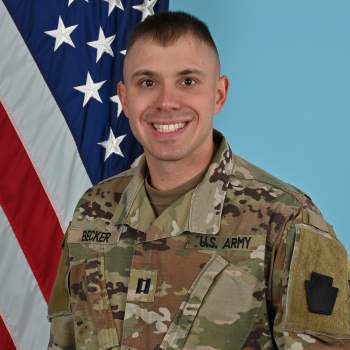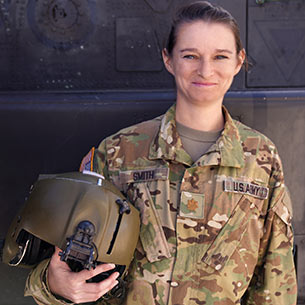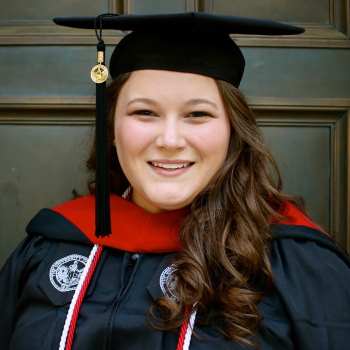Program Overview
The Bachelor of Science in Human Development & Family Studies with a concentration in Child Life offered online prepares you to become an expert in the growth and development of both healthy and hospitalized children.
Online Program Format
120 Credit Hours
$399 Tuition Per Hour
Improve the lives of children and their families by becoming a child life specialist.
As a child life specialist, you’ll act as an interdisciplinary member of the health care team — promoting optimum development of infants, children, adolescents and families, and helping them navigate times of stress. Child life specialists also promote effective coping through play, preparation, education and self-expression activities.
You can take classes from wherever you are and complete coursework at the time that best fits your schedule. Upon graduation, qualifying students may sit for the Child Life Professional Certification Examination.
The University of Alabama is leading the way in Child Life education. As one of the few universities in the country with PhD faculty in the area of Child Life, UA is able to offer students the highest quality experience with the leaders who are shaping the health care industry. These same professors are excited to extend that same quality to online students by being one of the first universities in the country to offer a degree with a concentration in Child Life completely online.
| Application Deadline | Applications accepted year round |
| Ranking | Ranked #1 for The Best Online Bachelor's in Human & Family Development Programs by TheBestSchools.org (2019) and 8th in the top 15 online Human Development and Family Studies degrees by AffordableColleges.com (2018) |
| Internship | Yes (600 hours) |
| Are test scores required? | ACT and SAT scores are not required through the Fall 2026 entry term |
| Scholarships and Grants Available | Discover a range of scholarships and grants to support your educational journey |
Curriculum
The program requires 120 hours and consists of a comprehensive foundation of courses related to the growth and development of the healthy child as well as the hospitalized child. Students participate in many laboratory and practicum experiences with children. These experiences, along with theoretical information, provide a foundation necessary for working with hospitalized children and their families. This curriculum leads to child life certification by allowing qualified students to sit for the Child Life Professional Certification Examination upon graduation.
Please note that courses are subject to change.
Major Courses (27 hours)
- HD 101 Life Span Human Development
- HD 202* Child Development Infancy & Toddlerhood
- HD 205* Early & Middle Childhood Development
- HD 302 Child Development – Adolescence
- HD 382 Parent and Family Development
- HD 472 Program Evaluation
- BSC 109 Introduction to Biology for Non-Majors II
- PY 101 Introduction to Psychology
- BER 345 Educational Statistics or HD 220 Research & Critical Thinking
- BSC 215 Human Anatomy and Physiology I
- BSC 216 Human Anatomy and Physiology II
*Course requires a field placement component, preferably at a National Association for the Education of Young Children (NAEYC) accredited preschool
Child Life Concentration
- HD 203 Medical Terminology
- HD 226* Introduction to Child Life
- HD 326* Play in Child Development
- HD 401 Cultural Influences on Children, Youth, and Families
- HD 426 Hospitalized Children and Youth
- HD 451 Loss and Bereavement
- HD 496 Child Life Internship
- PHL 223 Medical Ethics
View additional program information through the University’s catalog.
The field of child life is a very competitive field. Towards the end of coursework, students will be ready to apply and compete for child life internships. It is the student’s responsibility to obtain an internship site through the application process (i.e., application, interviews, and such). A minimum GPA of 3.0, 100 practicum and volunteer hours, competent interviewing skills, and the resources to relocate are basic requirements for students to enter the national competition for a child life internship.
Without a 3.0 GPA, 100 hours of quality practicum experience, and good interviewing skills, students discover it is sometimes very difficult to secure a child life internship. It is the student’s responsibility to acquire the skills and experiences needed to obtain an internship placement. While completing the child life coursework, students will need to continuously accumulate practicum hours with children, including in the hospital under Certified Child Life Specialists.
Admission
Formal admission into the Child Life Concentration requires the submission of an application packet after the student has completed 60 hours, including at least 12 hours of HD courses. Students must be accepted into the program before they can take HD 426, Hospitalized Children and Youth and before they can be scheduled for an internship. To learn more about applying to the Child Life Concentration, check out Special Requirements for Child Life Concentration.
To apply for formal admission to any of the undergraduate degree programs offered through UA Online, you must complete an admissions application and submit transcripts from all colleges previously attended. Transfer students considering admission should review UA’s transfer information and policies.
Frequently Asked Questions about the BS in HD&FS, concentration in Child Life Online
General Information
When does your program begin?
You can begin the child life concentration in the Fall, Spring, or Summer. Visit the UA academic calendar for when important dates. Application deadlines are July 15th for the fall semester, November 15th for the spring semester and April 15th for the summer semester.
How long does it take to complete this program?
This varies from student to student and depends on the following:
- Course Load – Some students have a full-time job, some are enrolled full-time, and some take only one course per semester. The maximum number of hours is 16 hours per semester.
- Course Availability – Not all courses are available each semester. Many upper-level courses have prerequisites that must be completed prior to enrolling an an upper-level course. Therefore, completing the prerequisites will also influence how quickly you complete the program Your advisor can assist you with planning your schedule.
- Course Enrollment Capacity – Each course has a maximum enrollment capacity. The enrollment capacity for each course is different and is based on course content.
Is there a maximum number of credit hours that can be transferred?
The university will only accept a maximum of 60 transfer credit hours from a 2-year institution (junior or community college) towards a degree. There is no limit on the number of hours that can be transferred from a 4-year institution. However, to earn an undergraduate degree from the university, you must complete a minimum of 33 hours from the university.
Can I complete the program or courses if I’m living outside the U.S.?
A majority of your coursework can be completed while living outside the U.S. Students are required and expected to have access to a reliable computer, broadband internet service, and to submit work in a timely manner. You will be expected to adhere to the same requirements and due dates for assignments as listed on the course syllabus. However, your final course in the program (HD 496) will be a child life internship and the internship will need to be completed in the U.S.
What if I already have a bachelor’s degree in another discipline?
If you previously completed a bachelor’s degree, you will need to complete the HDFS major courses, which is 55 hours of coursework.
Does this program require an internship?
Yes, students pursuing the child life concentration are required to complete an internship at an approved hospital with an established child life internship program. For more information on obtaining the required internship, check out the Child Life Internship Procedures. Prior to the final semester, it is the student’s responsibility to ensure necessary items are completed. Check out the Child Life Student Responsibility checklist.
Advising and Registering for Classes
Will I have an advisor?
Once your major is declared, the Department of Human Development and Family Studies will assign you an advisor and email you with information on how to contact your advisor. Each semester you will discuss which courses to take with your advisor.
How do I declare the child life concentration?
Formal admission into the child life concentration requires the submission of an application packet. To learn more about applying to the child life concentration, check out Special Requirements for Child Life Concentration.
Becoming a Child Life Specialist
Where do Child Life Specialists work?
Child Life Specialists are traditionally employed in the hospital setting. When considering child life, it is important to understand it is a career in which one needs to be willing to relocate for available job positions.
How do I become a Certified Child Life Specialist?
A Certified Child Life Specialist has met academic and professional requirements to obtain the CCLS credential. All Certified Child Life Specialists must complete a bachelor’s degree, ten courses related to child life including one child life theory course taught by a Certified Child Life Specialist, a supervised 600-hour internship, and pass a national exam.
Undergraduate Admission Instructions
How do I apply to the program?
You may find instructions on how to apply and links to the undergraduate application here.
Students submit an application to the child life concentration program usually during the second semester of their junior year. Acceptance and retention into the program is determined by:
- Satisfactory recommendation of HDFS faculty committee
- Overall GPA of 2.5 and a GPA of 2.5 in major core courses
- Satisfactory completion of required courses
Do you evaluate transcripts before admission?
Visit our Registrar’s website to learn more about transfer credit and visit the Transfer Course Equivalence Tables website. The Transfer Course Equivalence Tables will allow you to look up the university that you took your courses (or will take them) and it will reflect how the courses will transfer to UA from the other University or community college. If a course has 197 by the course suffix that means it will not transfer as a course here at the University of Alabama. If a course is not listed on this website then it has never been transferred here to The University of Alabama. For all other general education courses, or if you already have a bachelor’s degree, you will need to apply to the university in order to have an official transcript evaluation. Transcripts will be evaluated after you’ve completed the admissions process, and transcript reviews may take between 4-6 weeks to complete.
What if I am an International Student?
International students at The University of Alabama join a community that is culturally, academically, and economically diverse. Our students come from across the United States and more than 90 foreign countries, and international students represent almost 5 percent of our total student population. International students who are interested in pursuing a degree from The University of Alabama should first contact International Admissions. The final course in the child life concentration (HD 496) will be a child life internship and needs to be completed in the U.S.


Student Spotlight
Inspiring stories of success from students and alumni.
Take a look at some of our UA Online stories.
Contact Us
Program Information
Trevor McGhee
Admissions Representative 800-467-0227
trevorm.bama@ua.edu
Admissions Information
UA Online
800-467-0227
online@ua.edu










